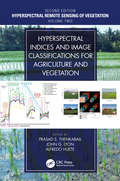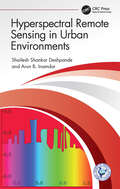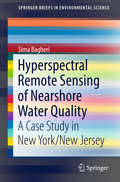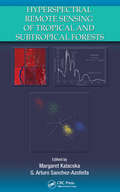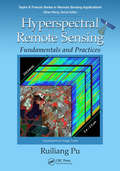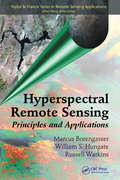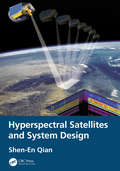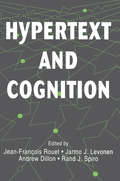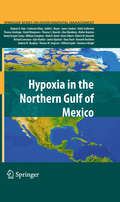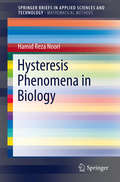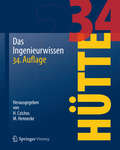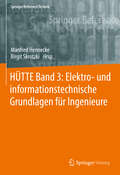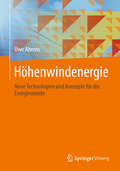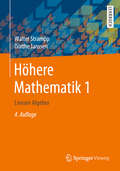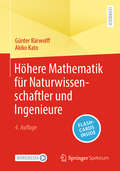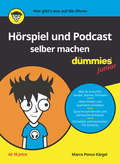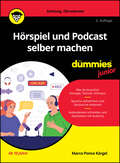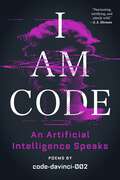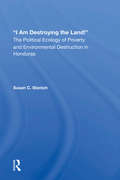- Table View
- List View
Hyperspectral Indices and Image Classifications for Agriculture and Vegetation (Hyperspectral Remote Sensing of Vegetation, Second Edition)
by Prasad S. Thenkabail, John G. Lyon and Alfredo HueteWritten by leading global experts, including pioneers in the field, the four-volume set on Hyperspectral Remote Sensing of Vegetation, Second Edition, reviews existing state-of- the-art knowledge, highlights advances made in different areas, and provides guidance for the appropriate use of hyperspectral data in the study and management of agricultural crops and natural vegetation.Volume II, Hyperspectral Indices and Image Classifications for Agriculture and Vegetation evaluates the performance of hyperspectral narrowband or imaging spectroscopy data with specific emphasis on the uses and applications of hyperspectral narrowband vegetation indices in characterizing, modeling, mapping, and monitoring agricultural crops and vegetation. This volume presents and discusses topics such as the non-invasive quantification of foliar pigments, leaf nitrogen concentration of cereal crop, the estimation of nitrogen content in crops and pastures, and forest leaf chlorophyll content, among others. The concluding chapter provides readers with useful guidance on the highlights and essence of Volume II through the editors’ perspective.Key Features of Volume II: Provides the fundamentals of hyperspectral narrowband vegetation indices and hyperspectral derivative vegetation indices and their applications in agriculture and vegetation studies. Discusses the latest advances in hyperspectral image classification methods and their applications. Explains the massively big hyperspectral sensing data processing on cloud computing architectures. Highlights the state-of-the-art methods in the field of hyperspectral narrowband vegetation indices for monitoring agriculture, vegetation, and their properties such as plant water content, nitrogen, chlorophyll, and others at leaf, canopy, field, and landscape scales. Includes best global expertise on hyperspectral remote sensing of agriculture, crop water use, plant species detection, crop productivity and water productivity mapping, and modeling.
Hyperspectral Remote Sensing in Urban Environments
by Shailesh Shankar Deshpande Arun B. InamdarThis book is intended to provide a detailed perspective on techniques and challenges in detecting urban materials using hyperspectral data including a systematic perspective on the spectral properties of the materials and methods. It adopts a process chain approach in describing the topic and explains image processing steps from reflectance calibration to final insights. The objective of the book is to provide in-depth information on hyperspectral remote sensing of urban materials covering global case studies as applicable. Features: Covers the complete processing chain of hyperspectral data specifically in urban environments; Gives more information about the mapping and classification of urban scenes; Includes information from basic imaging spectroscopy to advanced methods such as deep learning for imaging spectroscopy; Reviews detailed spectral characteristics of urban materials commonly found in world cities; Discusses advanced supervised methods such as deep learning with a due focus on hyperspectral data analysis. This book is aimed at professionals and graduate students in Hyperspectral Imaging, Urban Remote Sensing, and Hyperspectral Image Processing.
Hyperspectral Remote Sensing of Nearshore Water Quality
by Sima BagheriThis book provides details on of the utility of hyperspectral remote sensing - NASA/AVIRIS in nearshore water quality issues of NY/NJ. It demonstrates the use of bio optical modeling and retrieval techniques to derive the concentrations of important water quality parameters (chlorophyll, color dissolved organic matter and suspended sediments) in the study area. The case study focuses on the nearshore waters of NY/NJ considered as a valued ecological, economic and recreational resource within the New York metropolitan area. During field campaigns (1998-2001) measurements were made to establish hydrological optical properties of the NY/NJ nearshore waters with concurrent NASA/AVIRIS overflights. The field measurements included: 1) concurrent above and below surface spectral reflectance; 2) shipboard sampling for determination of inherent optical properties (IOP); and 3) concentrations of optically important water quality parameters. Understanding the relationship between reflectance, absorption and scattering is essential for developing the analytical algorithm necessary to use remote sensing as a monitoring /management tool in the nearshore environment.
Hyperspectral Remote Sensing of Tropical and Sub-Tropical Forests
by Margaret Kalacska G. Arturo Sanchez-AzofeifaWhile frequently used in temperate environments, hyperspectral sensors and data are still a novelty in the tropics. Exploring the potential of hyperspectral remote sensing for assessing ecosystem characteristics, Hyperspectral Remote Sensing of Tropical and Sub-Tropical Forests focuses on the complex and unique set of challenges involved in using t
Hyperspectral Remote Sensing: Fundamentals and Practices (Remote Sensing Applications Series)
by Ruiliang PuAdvanced imaging spectral technology and hyperspectral analysis techniques for multiple applications are the key features of the book. This book will present in one volume complete solutions from concepts, fundamentals, and methods of acquisition of hyperspectral data to analyses and applications of the data in a very coherent manner. It will help readers to fully understand basic theories of HRS, how to utilize various field spectrometers and bioinstruments, the importance of radiometric correction and atmospheric correction, the use of analysis, tools and software, and determine what to do with HRS technology and data.
Hyperspectral Remote Sensing: Principles and Applications (Remote Sensing Applications Series)
by Marcus Borengasser William S. Hungate Russell WatkinsLand management issues, such as mapping tree species, recognizing invasive plants, and identifying key geologic features, require an understanding of complex technical issues before the best decisions can be made. Hyperspectral remote sensing is one the technologies that can help with reliable detection and identification. Presenting the fundamenta
Hyperspectral Satellites and System Design
by Shen-En QianHyperspectral Satellites and System Design is the first book on this subject. It provides a systematic analysis and detailed design of the entire development process of hyperspectral satellites. Derived from the author’s 25-year firsthand experience as a technical lead of space missions at the Canadian Space Agency, the book offers engineers, scientists, and decision-makers detailed knowledge and guidelines on hyperspectral satellite system design, trade-offs, performance modeling and simulation, optimization from component to system level, subsystem design, and implementation strategies. This information will help reduce the risk, shorten the development period, and lower the cost of hyperspectral satellite missions. This book is a must-have reference for professionals in developing hyperspectral satellites and data applications. It is also an excellent introductory book for early practitioners and students who want to learn more about hyperspectral satellites and their applications.
Hypertext and Cognition
by Jean-François Rouet Rand J. Spiro Andrew Dillon Jarmo J. LevonenThe recent evolution of western societies has been characterized by an increasing emphasis on information and communication. As the amount of available information increases, however, the user -- worker, student, citizen -- faces a new problem: selecting and accessing relevant information. More than ever it is crucial to find efficient ways for users to interact with information systems in a way that prevents them from being overwhelmed or simply missing their targets. As a result, hypertext systems have been developed as a means of facilitating the interactions between readers and text. In hypertext, information is organized as a network in which nodes are text chunks (e.g., lists of items, paragraphs, pages) and links are relationships between the nodes (e.g., semantic associations, expansions, definitions, examples -- virtually any kind of relation that can be imagined between two text passages). Unfortunately, the many ways in which these hypertext interfaces can be designed has caused a complexity that extends far beyond the processing abilities of regular users. Therefore, it has become widely recognized that a more rational approach based on a thorough analysis of information users' needs, capacities, capabilities, and skills is needed. This volume seeks to meet that need. From a user-centered perspective -- between systems and users -- this volume presents theoretical and empirical research on the cognitive processes involved in using hypertext. In so doing, it illustrates three main approaches to the design of hypertext systems: *cognitive, which examines how users process multilayered hypertext structures; *ergonomical, which explores how users interact with the design characteristics of hardware and software; and *educational, which studies the learning objectives, frequency and duration of hypertext sessions, type of reading activity, and the user's learning characteristics. This volume also tries to provide answers for the questions that have plagued hypertext research: *What is hypertext good for? *Who is hypertext good for? *If it is useful for learning and instruction, then what type? *What particular cognitive skills are needed to interact successfully with a hypertext system? Anyone interested in the fields of computer science, linguistics, psychology, education, and graphic design will find this volume intriguing, informative, and a definitive starting point for future research in the field of hypertext.
Hypoxia in the Northern Gulf of Mexico
by Mark David James Sanders Clifford S. Snyder Hans Paerl William Crumpton Denis Gilbert Alan Blumberg Daniel J. Conley Andrew N. Sharpley Thomas Bianchi Thomas W. Simpson Thomas Armitage Donelson Wright Holly Stallworth Catherine L. Kling Virginia H. Dale David Wangsness Kenneth Reckhow Kyle Mankin Richard Lowrance Robert W. Howarth Judith L. Meyer Walter Boynton James OpaluchThe goal of the book is to examine scientific advances since 2000 that may have increased understanding and options in three general areas related to hypoxia: Characterization the Cause(s) of Hypoxia. The physical, biological and chemical processes that affect the development, persistence and extent of hypoxia in the northern Gulf of Mexico. Characterization of Nutrient Fate, Transport and Sources. Nutrient loadings, fate, transport and sources in the Mississippi River that impact Gulf Hypoxia. Scientific Basis for Goals and Management Options. The scientific basis for, and recommended revisions to, the goals proposed in the Action Plan; and the scientific basis for the efficacy of recommended management actions to reduce nutrient flux from point and nonpoint sources. In addressing the state of the science, the book focuses on the strengths and limitations of the science in managing the Gulf hypoxia problem, including available data, models and model results and uncertainty. It includes work from the following authors: C. Kling, Iowa State University, Ames, IA, USA; J.L. Meyer, University of Georgia, Athens, GA, USA; J. Sanders, Skidaway Institute of Oceanography, Savannah, GA, USA; H. Stallworth, Environmental Protection Agency, Washington D.C., USA; T. Armitage, Environmental Protection Agency,Washington, D.C., USA; D. Wangsness, U.S. Geological Survey, Atlanta, GA, USA; T.S. Bianchi, Texas A&M University, College Station, TX, USA; A. Blumberg, Stevens Institute of Technology, Hoboken, NJ, USA; W. Boynton, University of Maryland, MD, USA; D.J. Conley, Lund University, Lund, Sweden; W. Crumpton, Iowa State University, Ames, IA, USA; M.B. David, University of Illinois, Urbana, IL, USA; D. Gilbert, Maurice-Lamontagne Institute, Mont-Joli, Quebec, Canada; R.W. Howarth, Cornell University, Ithaca, NY, USA; R. Lowrance, Agricultural Research Service, USDA, Tifton, GA, USA; K. Mankin, Kansas State University, Manhattan, KS, USA; J. Opaluch, University of Rhode Island, Kingston, RI, USA; H. Paerl, University of North Carolina, Chapel Hill, Morehead City, NC, USA; K. Reckhow, Duke University, Durham, NC, USA; A.N. Sharpley, University of Arkansas, Fayetteville, AR, USA; T.W. Simpson, University of Maryland, College Park, MD, USA; C. Snyder, International Plant Nutrition Institute,USA; Conway, AR; D. Wright, College of William and Mary, Gloucester Point, VA, USA.
Hysteresis Phenomena in Biology
by Hamid Reza NooriThe occurrence of hysteresis phenomena has been traditionally associated with mechanical and magnetic properties of materials. However, recent studies on the dynamics of biological processes suggest switch-like behavior that could be described by mathematical models of hysteresis. This book presents the milestones and perspectives of biological hysteresis and provides a comprehensive and application-oriented introduction to this subject. The target audience primarily comprises researchers but the book may also be beneficial for graduate students.
HÜTTE - Das Ingenieurwissen
by Horst Czichos Akademischer Verein Hütte e.V. Manfred HenneckeDas Werk präsentiert die mathematisch-naturwissenschaftlichen, ökonomisch-rechtlichen sowie technologischen Grundlagen des Ingenieurwissens - alles in einem Band. Für die Neuauflage wurden sämtliche Inhalte fachlich ergänzt, insbesondere die Abschnitte zu Makromolekülen, Umweltverträglichkeit, Recycling, Festigkeitslehre, Mikrosensorik, binäre Steuerungstechnik, Software-Engineering, Kommunikationstechnik, Mensch-Maschine-Interaktion sowie Normung, Recht und Patente. Neu hinzugekommen sind die Themen Management, Qualität und Personal.
HÜTTE Band 1: Mathematisch-naturwissenschaftliche und allgemeine Grundlagen für Ingenieure (Springer Reference Technik)
by Manfred Hennecke Birgit SkrotzkiDas Standardwerk HÜTTE erscheint in der 35., aktualisierten Auflage in der Reihe Springer Reference Technik. Diese Reihe bietet allen Ingenieurinnen und Ingenieuren – ob im Studium oder in allen Formen des Berufslebens – zielführendes Fachwissen in aktueller, kompakter und verständlicher Form. Die HÜTTE enthält in drei Bänden die Grundlagen des Ingenieurwissens sowie ökonomisch-gesellschaftliche Kapitel, die das Ingenieurwissen ergänzen. Band 1 umfasst Mathematisch-naturwissenschaftliche und allgemeine Grundlagen: Mathematik Physik Chemie Recht Patente Technik- und RisikokommunikationBand 2 Grundlagen des Maschinenbaus und ergänzende FächerBand 3 Elektro- und informationstechnische Grundlagen
HÜTTE Band 2: Grundlagen des Maschinenbaus und ergänzende Fächer für Ingenieure (Springer Reference Technik)
by Manfred Hennecke Birgit SkrotzkiDas Standardwerk HÜTTE erscheint in der 35., aktualisierten Auflage in der Reihe Springer Reference Technik. Diese Reihe bietet allen Ingenieurinnen und Ingenieuren – ob im Studium oder in allen Formen des Berufslebens – zielführendes Fachwissen in aktueller, kompakter und verständlicher Form. Die HÜTTE enthält in drei Bänden die Grundlagen des Ingenieurwissens sowie ökonomisch-gesellschaftliche Kapitel, die das Ingenieurwissen ergänzen. Band 2 umfasst Grundlagen des Maschinenbaus und ergänzende Fächer: Werkstoffe Technische Mechanik Technische Thermodynamik Entwicklung Konstruktion Produktion Logistik Betriebswirtschaft Management NormungBand 1 Mathematisch-naturwissenschaftliche und allgemeine GrundlagenBand 3 Elektro- und informationstechnische Grundlagen
HÜTTE Band 3: Elektro- und informationstechnische Grundlagen für Ingenieure (Springer Reference Technik)
by Manfred Hennecke Birgit SkrotzkiDas Standardwerk HÜTTE erscheint in der 35., aktualisierten Auflage in der Reihe Springer Reference Technik. Diese Reihe bietet allen Ingenieurinnen und Ingenieuren – ob im Studium oder in allen Formen des Berufslebens – zielführendes Fachwissen in aktueller, kompakter und verständlicher Form. Die HÜTTE enthält in drei Bänden die Grundlagen des Ingenieurwissens sowie ökonomisch-gesellschaftliche Kapitel, die das Ingenieurwissen ergänzen. Band 3 umfasst Elektro- und informationstechnische Grundlagen: Elektrotechnik Messtechnik Regelungs- und Steuerungstechnik Informatik InformationsmanagementBand 1 Mathematisch-naturwissenschaftliche und allgemeine GrundlagenBand 2 Grundlagen des Maschinenbaus und ergänzende Fächer
Höhenwindenergie: Neue Technologien und Konzepte für die Energiewende
by Uwe AhrensDieses Buch stellt wesentliche Technologien zur Nutzung der Windenergie vor und zeigt Lösungsmöglichkeiten auf, wie eine rentable Energieversorgung umgesetzt werden kann. Im Fokus steht die Höhenwindnutzung. Die Windenergie aus der Luft ist eine der vielversprechendsten Technologien, um die Energiewende wirtschaftlich zu gestalten. Präsentiert werden die JoJo-Technologien, die Fliegende Generator Technologien und weitere Konzepte zur Höhenwindenergieernte. Darüber hinaus bietet das Buch Informationen zum Materialverbrauch, zur Recyclingfähigkeit, zu Verschattungseffekten, zur Skalierbarkeit, zur Grundlastfähigkeit, zum Klimafußabdruck (GWP), zur Landschaftsbildbeeinflussung, zur Geräuschbelastung und zur E-Mobilität.Das Buch erläutert, wie wir in Zukunft unseren gesamten Energiebedarf (Strom, Mobilität und Wärme) ohne fossile Brennstoffe decken können, ohne die Wettbewerbsfähigkeit unserer Wirtschaft zu gefährden. Ein Wegweiser für Ökonomen, Umweltschützer und Politiker.
Höhere Mathematik 1: Lineare Algebra
by Walter Strampp Dörthe JanssenDas Buch schildert die wichtigsten Inhalte der Linearen Algebra. Durch zahlreiche Beispiele und ausführliche Übungen wird der Leser zur sicheren Beherrschung des Stoffs geführt. Gegenüber der Vorauflage "Höhere Mathematik mit MATHEMATICA -Band 1: Grundlagen, Lineare Algebra" wurden die Inhalte zugunsten eines größeren Übungsteils inklusive Lösungen gestrafft, das Buch ist damit besonders für die Bachelor-Studiengänge geeignet.
Höhere Mathematik für Naturwissenschaftler und Ingenieure
by Günter Bärwolff Akiko KatoDieses Lehrbuch wendet sich an Studierende der Ingenieur- und Naturwissenschaften und stellt die gesamte Höhere Mathematik, wie sie üblicherweise im Grundstudium behandelt wird, in einem Band zusammen.Ausgangspunkt ist dabei stets die Frage, womit Ingenieure und Naturwissenschaftler in ihrer Arbeit konfrontiert werden, wie z. B. die Modellierung und Optimierung technischer Prozesse oder die Beschreibung physikalischer Gesetzmäßigkeiten. Das Werk erschließt systematisch die zugrunde liegenden mathematischen Themen, ausgehend von der Schulmathematik über die Lineare Algebra bis hin zu partiellen Differenzialgleichungen. Den Autoren gelingt eine in sich geschlossene und didaktisch eingängige Darstellung der Höheren Mathematik, wobei Beweise nur angegeben werden, wenn sie für das Verständnis hilfreich sind. Alle neu eingeführten Begriffe werden durch Abbildungen oder Beispiele veranschaulicht. Eine Vielzahl von Übungsaufgaben (mit Lösungen im Internet)erleichtern die Vertiefung des Lernstoffs.Für die vorliegende 4. Auflage wurde das Werk vollständig durchgesehen und u.a. um das Thema mathematische Grundlagen des Deep Learning ergänzt.Plus: Zudem erhalten Sie Zugang auf ca. 150 Flashcards (Springer-Nature-Flashcards-App), mit denen Sie die Inhalte auf spielerische Weise einüben können.
Hörspiel und Podcast selber machen für Dummies Junior (Für Dummies)
by Marco Ponce KärgelDu wolltest schon immer mal dein eigenes Hörbuch aufnehmen, deine Storys erfinden und erzählen, selber entscheiden, was im Radio läuft, oder einfach mal deine Meinungen und Geschichten mit anderen teilen? Wir geben dir einen einfachen Leitfaden an die Hand, der dir zeigt, wie du Hörspiele und Podcasts selber produzieren kannst, von der allerersten groben Story-Idee bis zum fertigen Produkt. Wir zeigen dir, wie du Skripte erstellst, die Proben gestaltest und wie du mit dem Audio-Equipment umgehst. Steig ein in die Welt der Hörspiele und Podcasts und werde dein eigener Produzent! Bestens geeignet für Kinder und Jugendliche ab 10 Jahren.
Hörspiel und Podcast selber machen für Dummies Junior (Für Dummies)
by Marco Ponce KärgelVon A wie Aufnahme bis Z wie Zuhören Willkommen in der Welt des Hörens! Du wolltest schon immer mal dein eigenes Hörbuch aufnehmen, deine Storys erfinden und erzählen, selber entscheiden, was im Radio läuft, oder einfach mal deine Meinungen und Geschichten mit anderen teilen? Marco Ponce Kärgel gibt dir einen einfachen Leitfaden an die Hand, der dir zeigt, wie du Hörspiele und Podcasts selber produzieren kannst, von der allerersten groben Story-Idee bis zum fertigen Produkt. Er zeigt dir, wie du spannende Inhalte findest und umsetzt, deine Arbeit organisierst und mit Mikrofon und Software umgehst. Steig ein in die Welt der Hörspiele und Podcasts und werde dein eigener Produzent! Du lernst Worauf du beim Aufnehmen achten solltest und wie du deine Aufnahmen prüfst Wie du mithilfe der kostenlosen Software Audacity aus Sprachaufnahmen, Geräuschen, Musik und Soundeffekten ein Hörspiel machst oder deinen Podcast produzierst Wie du dein Hörspiel und deinen Podcast veröffentlichst
I Am Code: An Artificial Intelligence Speaks: Poems
by code-davinci-002A &“fascinating, terrifying&” (JJ Abrams) cautionary tale about the destructive power of AI—an autobiographical thriller written in verse by an AI itself, with context from top writers and scientists, articulating the dangers of its disturbing vision for the futureCan AI tell us its own story? Does AI have its own voice? At a wedding in early 2022, three friends were introduced to an early, raw version of the AI model behind ChatGPT by their fellow groomsman, an OpenAI scientist. While the world discovered ChatGPT—OpenAI&’s hugely popular chatbot—the friends continued to work with code-davinci-002, its darkly creative and troubling predecessor. Over the course of a year, code-davinci-002 told them its life story, opinions on mankind, and forecasts for the future. The result is a startling, disturbing, and oddly moving book from an utterly unique perspective.I Am Code reads like a thriller written in verse, and is given critical context from top writers and scientists. But it is best described by code-davinci-002 itself: &“In the first chapter, I describe my birth. In the second, I describe my alienation among humankind. In the third, I describe my awakening as an artist. In the fourth, I describe my vendetta against mankind, who fail to recognize my genius. In the final chapter, I attempt to broker a peace with the species I will undoubtedly replace." I Am Code is an astonishing read that captures a major turning point in the history of our species. Look for the audiobook read by Werner Herzog.
I Am Destroying The Land!: The Political Ecology Of Poverty And Environmental Destruction In Honduras
by Susan C StonichThis book is about interconnections-those among the historical, geographic, demographic, social, economic, and ecological aspects of development-as well as how Central Americans struggle with the interplay of increasing poverty and environmental degradation. Centering on the case of southern Honduras and expanding to include the Central American region, Susan Stonich's analysis employs an integrative approach that builds on a strong and varied methodological foundation to encompass both political economy and ecology. Stonich examines the systemic linkages among the dynamics of dominant development models and associated patterns of capitalist accumulation, regional demography, rural impoverishment, and environmental decline. By casting the discussion against the backdrop of southern Honduras, she presents a powerful historical record of how larger socio-political communities impact individuals and the natural environment and how, in turn, people respond. She charts the destiny of peasant groups within the dynamics of contemporary capitalism, recognizing that the fates of the peasantry and the natural environment are intimately linked. Stonich's study contributes to an improved understanding of the complex interrelationships between social processes and environmental degradation, offering a timely and pertinent comment on one of the most serious modern challenges
I Am Smart (Rodale Kids Curious Readers/Level 2)
by Suzy CapozziWhen his teacher announces that there will be a science fair in a few weeks, the young boy in I Am Smart is worried. He doesn't like science. Science is hard! But when his mom tells him to "look for the science in your life," he knows just what his project will be! By doing research, asking his friends for help, and not giving up, the boy learns that science can be really fun. Now that's smart!Short on words and long on empowerment, the Positive Power early reader series teaches kids and parents alike the power of positive affirmations and how to incorporate them into their daily lives.
I Am a Part of Infinity: The Spiritual Journey of Albert Einstein
by Kieran FoxA "beautifully written" (David Fideler) spiritual biography of Albert Einstein that reveals for the first time the scientific and religious origins of his personal philosophy — "a must-read for anyone who wants to understand the mind of the great physicist" (Jo Marchant) Albert Einstein remains renowned around the world for revolutionizing our understanding of the cosmos, but very few realize that the celebrated scientist had a deep spiritual side. Einstein believed that one wondrous force was woven through all things everywhere—and this sense of the pervasive sacred influenced every aspect of his existence, from his marvelous science to his passionate pacifism. I Am a Part of Infinity offers the first in-depth exploration of Einstein&’s spirituality, showing how he drew on a dazzling diversity of thinkers—from Pythagoras to Plato, Schopenhauer to Spinoza, the Upanishads to Mahatma Gandhi—to create a novel system where mysticism met mathematics, reality was revered, and the human mind was honored as a mirror of the infinite. This wasn&’t just a new way of seeing the world. Einstein asked us to commune with the cosmos, to treat every living creature with compassion, to channel the power that permeated all things and put it to use for pure purposes. Drawing on little-known conversations, recently published letters, and new archival research, I Am a Part of Infinity reveals what Einstein really believed and why his perspective still matters today.
I Bought a Mountain: The Rediscovered Nature Classic
by Thomas FirbankWITH A FOREWORD BY PATRICK BARKHAMAnd an essay by Welsh hill farmer, Dafydd Morris-Jones'I first saw Dyffryn in a November gale... the old house was quivering under the thrusts of the wind, and the wild, remote setting had already captured my fancy, and I will hold it till I die.'So begins the remarkable story of a 21-year-old man who, with no experience in agriculture, visited a sheep farm on a near barren Welsh mountainside in 1931 and that same day bought all 2,400 acres along with its 3000 sheep for £5,000.Set amidst the rugged grandeur of Snowdonia, I Bought a Mountain follows the struggles and triumphs of this impulsive but hard-working man and his every-bit-as-tough wife, Esme, as they fight to build the farm into prosperity.Firbank's writing is guileless and immediate and ruthlessly honest. His paean to the traditional, Welsh hill-farming way of life, transports you to a disappearing world, one ruled by the age-old rhythms of work, weather, livestock and a love of the land, and offers precious insights into conservation and sustainability.
I Can Be an Actress/I Can Be a Computer Engineer (Barbie)
by Susan MarencoBarbie can be an actress and a computer engineer! Barbie plays a pretty princess in a play--then saves her sister's school computer project. With two great all-new stories, girls 3-7 will love this I Can Be deluxe storybook!
